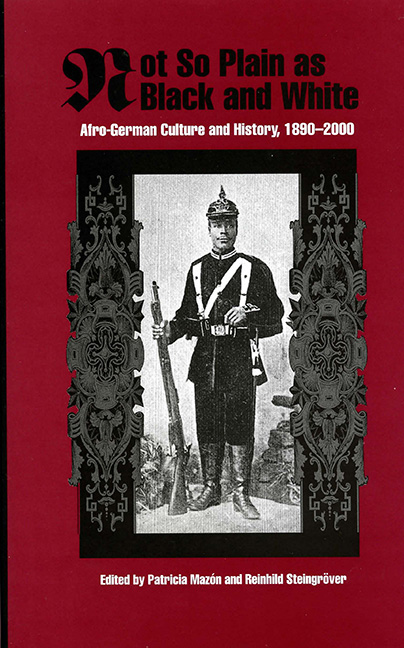Book contents
- Frontmatter
- Contents
- Foreword
- Introduction
- Part I Afro-Germans in Historical Perspective
- Part II Cultural Representations and Self-Representations of Afro-Germans
- 4 Louis Brody and the Black Presence in German Film Before 1945
- 5 Narrating “Race” in 1950s’ West Germany: The Phenomenon of the Toxi Films
- 6 Will Everything Be Fine? Anti-Racist Practice in Recent German Cinema
- 7 Writing Diasporic Identity: Afro-German Literature since 1985
- 8 The Souls of Black Volk: Contradiction? Oxymoron?
- Selected Bibliography
- Notes on Contributors
- Name Index
6 - Will Everything Be Fine? Anti-Racist Practice in Recent German Cinema
from Part II - Cultural Representations and Self-Representations of Afro-Germans
Published online by Cambridge University Press: 11 May 2017
- Frontmatter
- Contents
- Foreword
- Introduction
- Part I Afro-Germans in Historical Perspective
- Part II Cultural Representations and Self-Representations of Afro-Germans
- 4 Louis Brody and the Black Presence in German Film Before 1945
- 5 Narrating “Race” in 1950s’ West Germany: The Phenomenon of the Toxi Films
- 6 Will Everything Be Fine? Anti-Racist Practice in Recent German Cinema
- 7 Writing Diasporic Identity: Afro-German Literature since 1985
- 8 The Souls of Black Volk: Contradiction? Oxymoron?
- Selected Bibliography
- Notes on Contributors
- Name Index
Summary
Nabou (Kati Stüdemann), Afro-German, techno-punk, and lesbian, stands at the window of a subway kiosk where she works. The lace hat of her uniform perched awkwardly on top of her hair, she cuts a comic figure. In a counter-shot we find a customer asking for that European confection known in German as a Negerkuß, a “nigger kiss”—cookie on the bottom topped by a mound of marshmallow and all dipped in chocolate so that it comes to a point. Nabou at first responds to the request with incomprehension, but the customer in counter-shot persists with her request. Nabou's boss intervenes, demanding that Nabou carry out her job politely. Nabou demands that either the customer order a Schokokuß, a “chocolate kiss,” the new name that circulates in a more racially sensitive German vocabulary, or the customer receives nothing at all. In the face of the others’ continuing incomprehension and her boss's attempt to smooth things over, Nabou explodes in anger and storms off. The customer and boss express only confusion, the boss now demanding from a distance that Nabou give the customer “a nice nigger kiss.” Nabou departs, quipping at the white German women, “aw kiss yourselves.” The scene has the possibility to be central to a tragic story, especially in a post-unification Germany where since 1992 violent attacks by the far right on “foreigners,” that is, those who look, think, or act different than the popular imaginary of the white racist, have increased steadily to sixteen hundred. However, this is a film by Angelina Maccarone, and that means humor, entertainment, and enlightenment. The spectator can sit back and expect to laugh, not at but with the film's main characters as they confront the challenges presented by life in the new Federal Republic of Germany (FRG).
Angelina Maccarone's film Alles wird gut (Everything Will Be Fine) premiered at the New York Gay and Lesbian Film Festival in 1997, then had its German debut on television in the Fall of 1998 in the successful movie series “Wild Hearts” (Wilde Herzen). Everything Will Be Fine takes as its subject the antics of two Afro-German women, Kim and Nabou.
- Type
- Chapter
- Information
- Not So Plain as Black and WhiteAfro-German Culture and History, 1890–2000, pp. 161 - 182Publisher: Boydell & BrewerPrint publication year: 2005

